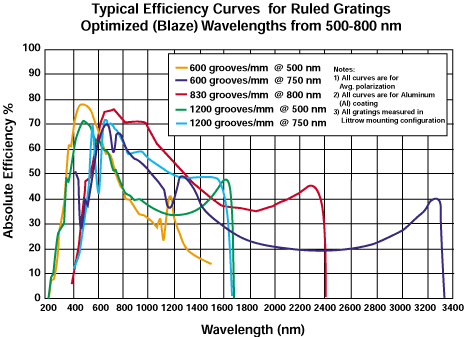
繞射光柵是光學元件,可將多色 (白色) 光分隔 (繞射) 為多種波長分量。每個光柵都由多次複製的高精度母光柵構成。重複光柵的複製流程如下所述。
這些高品質的儀器級直紋光柵幾乎符合您的所有繞射需求,尤其是在您最需要高效率時,更是如此。可以根據尺寸、溝槽間距與閃耀波長來選取光柵。理論上的分辨能力與母光柵上每公釐的溝槽數量直接成比例。閃耀角與溝槽間距可確定光柵效率最大的特定波長與光譜區域。
Diffraction ruled gratings are used in a variety of monochromators for research, student and industry use. Almost all commercially available spectrophotometers (ultraviolet, visible, infrared, fluorescence, Raman, atomic absorption) utilize diffraction gratings to select specific wavelengths or scan over a wavelength interval. Generally, replicated ruled gratings should be used when high peak efficiency and throughput is required. Replicated holographic gratings should be used when minimum stray light is critical and high resolution is needed. Note: Damage thresholds for both ruled and holographic gratings are 350 milli-joules/cm2 for pulsed lasers and 40 Watts/cm2 for CW lasers.
Handling Gratings: Gratings require special handling, making them prone to fingerprints and aerosols. Gratings should only be handled by the edges. Before attempting to clean a grating, please contact us.
Ruled diffraction gratings are produced by ruling a series of closely spaced, straight parallel grooves into an optically flat aluminum coated substrate, known as the “master grating.” Precise, interferometrically-controlled ruling engines utilize a very fine diamond tool to form a sawtooth-shaped groove profile at a given angle (commonly referred to as the blaze angle) on the surface of a prepared substrate. The replication process begins with the surface contour of a ruled master grating being vacuum deposition-coated with an extremely thin separation layer. An aluminum coating is then deposited on top of this separation layer. Then, an epoxy-coated flat glass substrate is placed on top of the layer-covered master, duplicating the grooved surface. The combination is cured and the process is finished when the replicated grating is separated from the master grating.

or view regional numbers
QUOTE TOOL
enter stock numbers to begin
Copyright 2023, Edmund Optics Inc., 14F., No.83, Sec. 4, Wenxin Road, Beitun District , Taichung City 406, Taiwan (R.O.C.)
California Consumer Privacy Act (CCPA): Do Not Sell My Information